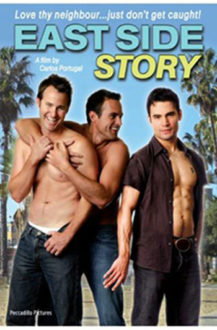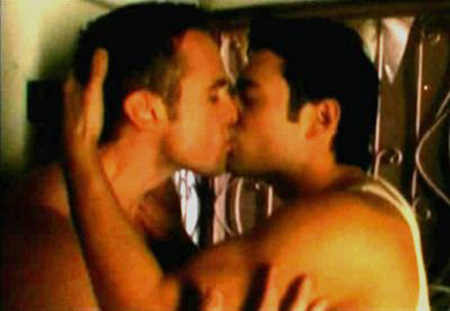 East Side Story
East Side Story
Directed by Carlos Portugal
Written by Carlos Portugal and Charo Toledo
Premiered June 7, 2006 at the Newfest Film Festival
Comedy (romance)
88 min.
Review by Stephen O. Murray
May 10, 2007.
The stories of gay gentrification of a heretofore Chicano neighborhoods in L.A., Quinceañera and East Side Story, were both released in 2006.
The latter is the more focused on the gay characters, with a Chicano who becomes charming and sympathetic much later in the proceedings than the one in Quinceañera. Both have attractive Chicano leads, Jesse García in Quinceañera, René Alvarado in East Side Story.
East Side Story, directed and co-written by Carlos Portugal, opens with a border-crossing role play in which Diego Campos [Alvarado] is playing a border patrolman who forces Pablo [David Berón] to service him, overriding Pablo’s pleas that he is married. Outside their role plays, realtor Pablo also pretends to be straight and breaks up with Diego over Diego’s pressure on him to come out. Not that Diego is all that out himself.
He works hard at his grandmother’s Mexican “family restaurant,” Tió Pepe’s. Diego’s parents were killed by a drunk driver, and he has been raised by his abuela Sara [Irene DeBari], a pragmatist except in indulging her pretentious daughter (who is Diego’s aunt/tiá though about his age and considerably less mature and responsible than he is) who has changed her name from Blanco to Bianca [Puerto Rica-born Gladise Jimnez]. Diego is frustrated at his work financing his young aunt’s European life. He is more than frustrated when Pablo starts dating her and watching her fall in love with the man with whose sexual orientation Diego is intimately familiar.
A gay couple has bought the house across the street from the Campos’s. The couple consists of Wesley [Steve Callahan], who has some cultural sensitivity and is drawn to Diego, and Mississippi-born Jonathan [Cory Alan Schneider] who has none and is alarmed at the visible mutual attraction of Wesley and Diego. Schneider is very good at being annoying and desperate (backstory was shot and is available in the DVD’s deleted scenes).
The movie is a romantic comedy, so the viewer can be confident that things will come out right in the end. Bianca resists recognizing that Pablo is gay and that she is less fabulous than she would like to be. Diego and Wesley come together and are torn apart. Pablo persists in his narcissism and posing as being heterosexual, and Grandma retires to Tijuana leaving her daughter and grandson to renovate the restaurant. Diego goes to culinary school and dreams of having a restaurant for foodies; he had been planning to move to Phoenix when his grandmother returned.
The Campos women are very funny, and Grandma Sara gets the best line:
I’m gone for a month, the chef dies, the restaurant is bankrupt, your ex-boyfriend is now engaged to my daughter, and I find you in bed with the gringo from across the street!
Both the homophobia (of the cook and waitress…and Pablo) and the Latinophobia of the West Hollywood gays (Jonathan and his friends) are played for laughs, as are the soap opera elements of the love stories. Alvarado’s Diego reminded me of Hal Sparks’s Michael Novotny on the American Queer As Folk, both in appearance and in long-sufferingness (and even in eventually getting a hunky WASPy lover).
Alvaradro appeared in the 2014–15 season of the tv series East Los High, written and directed by Portugal. Neither they nor Jiminez have had the careers that, judging by East Side Story, they should have had.
First published by epinions, 10 May 2007
©2007, 2017, Stephen O. Murray


